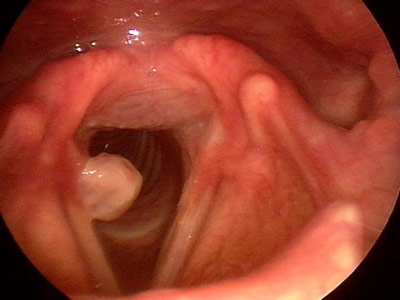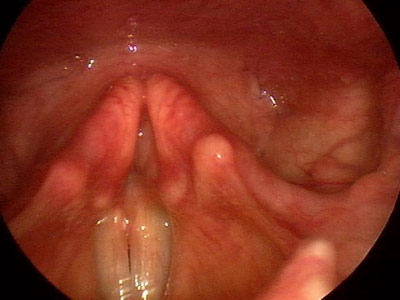- Question: How do the ingredients in e-cigarettes and vaporizers affect respiratory health? - August 16, 2019
- Bad Technique and Vocal Injury - January 9, 2019
- Is Edible Marijuana Dangerous for the Voice? Myths Dispelled - December 18, 2018
- Surprise! You have a hemorrhage - January 31, 2018
- Graves’ Disease: Treatment Overview - September 25, 2017
- Adele and the Stigma of Vocal Injury - July 11, 2017
- Vocal Curbside Consult: How does the thyroid affect the voice? - May 16, 2017
- Vocal Curbside Consult: How do hormones affect the voice? - May 3, 2017
- Vocal Curbside Consult: How do emotion and stress affect the voice? - April 17, 2017
- Vocal Curbside Consult: Vocal Recovery After Illness - April 7, 2017
The patient is a 42 year old director who has noted progressive worsening of his voice over several months. He noted initial onset after a 3 week movie shoot, where he had to use his voice excessively. He went to an ENT who noted the presence of a vocal granuloma. She suggested he have surgery to remove the granuloma as well as reflux medication. He sought a second opinion here and videostroboscopy confirmed the presence of a vocal process granuloma. This image is seen below.


The patient had not had any trial of conservative treatment. I therefore instituted a medication and lifestyle protocol as well as voice therapy. Two months later, the following was seen on videostroboscopy:

Discussion:
Vocal process granulomas most commonly occur in the setting of uncontrolled reflux and excessive and incorrect voice use. The arytenoid cartilages, which sit in the back of the larynx, have a prominence in the posterior glottis, called the vocal process. This area is covered by a thin layer of mucosa. Excessively loud or incorrect voice use results in overly-forceful closure of the cartilage. This can traumatize the mucosa, exposing the underlying vocal process cartilage.
When acidic gastric contents contact the exposed cartilage, the tissue becomes very irritated and inflamed. The body initiates an attempt to heal the mucosa and cover the vocal process cartilage. The healing process is not precise, and the inflammatory process results in a granuloma formation.
When the pathophysiology is considered, it makes the most sense to try to reverse the causes rather than simply cutting off the granuloma. Granulomas are notorious for recurring after surgical removal. This is because the underlying processes (voice misuse and reflux) are not addressed when surgery is performed.
Granulomas are very disruptive to the voice because they prohibit vocal fold closure by virtue of their position between the vocal processes. When large enough, granulomas can also sit on top of the vocal folds and dampen any vibration. Conservative management is, however, the best initial step in avoiding unnecessary surgery and preventing granuloma recurrence.
To learn more about Dr. Reena Gupta or vocal process granulomas, please visit www.voicedoctorla.com.



